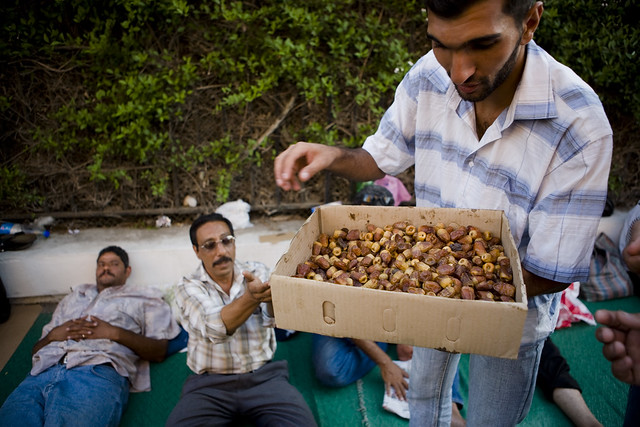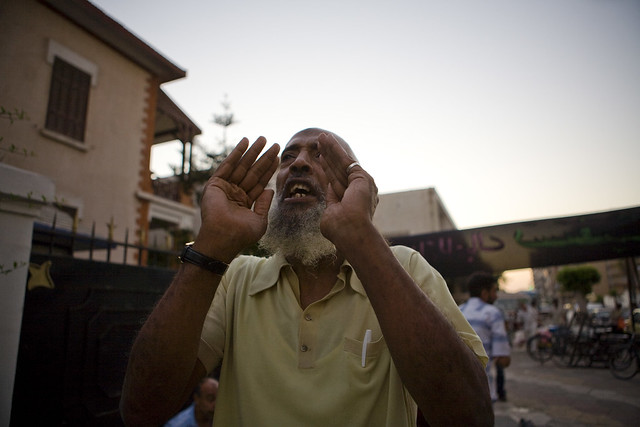The Interior Ministry has issued a detention decree against two journalists, Ad-Dustour’s Hossam el-Wakil and Ikhwan Online’s Muhammad Dawoud. The two were arrested and beaten up by the police while covering Alexandria’s school closure clashes and ordered to be released by the prosecutor on 25 September.
Tag: ikhwan
Canal Ropes Company Workers’ Strike
I took the pic above Tuesday in Port Said, as the Canal Ropes Company strikers were about to break their Ramadan fast at sunset. The worker in the ground reaching with his hand to take the dates is a Coptic worker, named Labib Guergiss (Also seen in the pic below).
Virtually all workers I meet during strikes, including their leaders, tend to be religiously devout. Many of the Muslims have beards, prayer marks on their foreheads (zebiba), and pray regularly.
The women workers are usually dressed in higab, if not niqab.
The Copts have crosses tattooed on their arms, a practice common among middle and working class Christians. The religiosity however does NOT translate itself mechanically into:
1- Sectarian attitude among the workers from two sects: On the contrary, unity is strongly forged among the strikers, and among the newly rising layer of strike leaders there is a significant number of Copts.
2- A political affiliation or sympathy to the Muslim Brotherhood: No, the biggest and most organized opposition force, as the cliche goes, is not active among labor circles. Its base of support lies mainly among the middle class professionals, lower middle classes and the Islamized sections of our elite. Their capitalist economic agenda, and vague oscillating stands towards privatization, weak intervention on behalf of workers in industrial conflicts that erupt in their parliamentarian constituencies and the general retreat the organization is going through since the 2006 crackdown, means an confused stand towards the strike wave. I usually ask strike leaders I interview on their views regarding the MBs. The responses vary from overt hostility to “they are good people. They do charity.” But in almost all cases, the strikers cite no direct help from the group, let alone leadership.
3- Hostility to the left: Being religious, contrary to the stereotype, does not mean a hostility to leftists and secular activists. Unlike the liberal secularists, radical leftists have a different stand towards religion, and do not put religion as the enemy or as the focal point of the current malaise. I found the workers themselves when they are struggling, to be welcoming to any sincere effort to help them, whether it’s coming from a secular, an Islamist or the devil. What matters for them is who does what during the strike to make it successful? Who stands by them, who stands against them? Who puts 110% effort into a solidarity campaign with them, and who doesn’t give a shit? Some of the strike leaders I know in industrial and service sectors are increasingly describing themselves as “socialists” or “Marxists” while carefully observing the prayer timings, fasting Ramadan, and have zebibas on their foreheads. Personally they are religious, but the political program they present and advocate is left-leaning and secular. There is a clear shift in the mood among the workers and public to the left. It’s been a slow, incremental change that started with the outbreak of the Palestinian intifada eight years ago… a change that has been missed by the Western journalists and researchers obsessed with stories on terrorism, the veiled oppressed women, and the Red Sea Rivera.
4- Subordination of women in the industrial action: The participation of the women workers in the strike wave is an amazing story. They triggered the Winter of Labor Discontent, produced strike leaders and trade union activists, and are defying established gender roles. A Westernized feminist who looks at the pix of the strikers and finds the women to be veiled or in niqab and thus draws a negative conclusion about their status, will miss the whole point.
MB blogger still detained, despite court release orders
Sarah Carr reports:
Mamdouh El-Mounir, a member of the Muslim Brotherhood, who has spent over three months in detention in violation of court release orders, was issued another detention order on Saturday.
El-Mounir, MB member from the Delta town of Mahalla, is currently being held in the Wady El-Natroun prison.
On Monday July 21 the emergency state security public prosecution office in Tanta ordered that El-Mounir be released.
This is the second court order for the release of El-Mounir.
Rather than being released he was taken to the state security investigations office in Tanta where he remained until last Saturday, when he was informed that a detention order had again been issued against him.
Lawyer Zakaria Fathy told Daily News Egypt that El-Mounir was arrested on April 8 against the background of the violent clashes between local residents and security bodies which took place in the town on April 6.
“El-Mounir disappeared after his arrest for 16 days until he appeared in court in Mahalla on April 24,” Fathy said.
An administrative detention order was issued against El-Mounir in April despite the fact that the Tanta court ordered his release.
Egyptian rights groups say that the system of administrative detention instituted under the emergency law has created a parallel system of justice outside the jurisdiction of the ordinary courts.
They allege that tens of thousands of Egyptians are being held in administrative detention, sometimes for years, and frequently in violation of release orders issued by courts.
Fathy alleges that El-Mounir was tortured while in the custody of state security investigations.
“He had been severely tortured in the state security investigations office in Mahalla during the 16 days he had disappeared, including through the use of electric shocks,” he told Daily News Egypt.
Hundreds of Mahalla residents were arrested during, or after the clashes which occurred on the April 6 and several of those detained have alleged that they were tortured at the hands of state security investigations officers.
Muhammad Maree, who was interpreting for US student/journalist James Buck when he was arrested in Mahalla on April 10 and disappeared for 19 days after his removal from the Mahalla police station in which he was initially held.
He alleges that he was physically abused, threatened that he would be killed and kept in solitary confinement in the Mahalla state security investigations office during the 19 days in which he was missing.
Marei was detained for 90 days under a detention order until his release without charge this month.
Some of a group of 49 Mahalla residents facing trial on what lawyers say are trumped-up charges related to the events of the April 6, also allege that they were tortured while in police custody in Mahalla.



